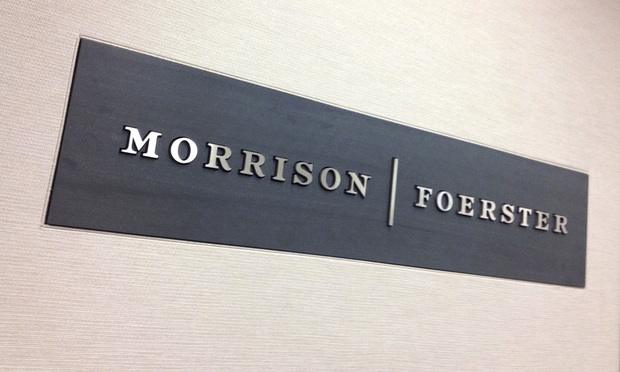'Mommy Track Is a Dead End' at MoFo, Associates Claim in New Lawsuit
The proposed class action is the latest gender bias case brought by plaintiffs firm Sanford Heisler Sharp, whose other law firm targets have included Proskauer Rose, Chadbourne & Parke and Sedgwick.
April 30, 2018 at 12:24 PM
5 minute read
The original version of this story was published on The American Lawyer
 (Photo: Diego M. Radzinschi/ALM)
(Photo: Diego M. Radzinschi/ALM)
Three female Morrison & Foerster associates in California have accused the firm of gender discrimination, alleging in a proposed $100 million class action that MoFo routinely holds back mothers and pregnant women, giving them lower pay and promotion opportunities compared to male peers.
“MoFo discriminates against women by permitting its predominantly male leadership to favor men overtly in pay, promotions, and other opportunities regardless of their qualifications and to otherwise discriminate against women, pregnant women and mothers. MoFo leadership fosters or condones a firm culture that marginalizes, demeans and undervalues women and mothers,” the complaint alleged. Sanford Heisler Sharp, the firm representing the female plaintiffs, said the lawsuit was filed Monday morning in San Francisco federal court.
The suit—which includes claims under the federal Equal Pay Act, Title VII of the Civil Rights Act of 1964, the Family and Medical Leave Act and similar California state laws—seeks back pay and damages totaling $100 million.
Morrison & Foerster said in a statement that it rejected the women's allegations. “Morrison & Foerster has a long and proven track record of supporting and advancing our associates as they return from maternity leave,” the firm said. “We vigorously dispute this claim and are confident that the firm will be vindicated.”
The complaint said MoFo runs as a “male-dominated hierarchy” that has particularly negative impacts on women who are pregnant or returning from maternity leave. MoFo, according to the complaint, has embraced a common set of policies and procedures that “routinely holds back” women who are pregnant, have children or take maternity leave—meaning, in some cases, that associates who have taken maternity leave won't be advanced to a higher pay range along with their peers.
“At MoFo, the mommy track is a dead end,” the suit said.
The three lead plaintiffs are dubbed “Jane Doe 1,” “Jane Doe 2” and “Jane Doe 3,” and all are based in California offices at the firm, according to the complaint. MoFo has offices in Los Angeles, San Diego, San Francisco and Palo Alto, California.
The lead plaintiffs also allege that they weren't notified in advance that they would be held back in seniority, instead discovering it only after they checked the firm's online employment portal in January and realized their salaries no longer matched others' in their associate class year.
In addition to the three lead women plaintiffs, the complaint seeks to represent a proposed class of all women that have been or will be employed by MoFo starting on June 28, 2017.
“In one California office alone, plaintiffs are aware that, since 2013, at least seven female attorneys have been held back upon their return from maternity leave,” the complaint said. “These policies disparately impact the firm's female attorneys, who represent an increasingly lower percentage of each tier of the firm as title and compensation rise.”
The firm representing the MoFo associates, Sanford Heisler, has led several recent gender discrimination actions against large law firms, including Proskauer Rose, Chadbourne & Parke, Ogletree, Deakins, Nash, Smoak & Stewart, Sedgwick and Greenberg Traurig. The Sedgwick, Greenberg Traurig and Chadbourne cases have settled—the Chadbourne suit, for one, was resolved in March with a $3 million payout to three former partners at the firm led by Kerrie Campbell. The Ogletree and Proskauer cases remain pending.
“MoFo promotes itself as a progressive firm that champions the advancement of women, but that seems to be far from the truth,” name partner David Sanford said in a statement on Monday. “At MoFo, motherhood is a career-breaker.”
Similar to the Proskauer suit, which was moving forward with a Jane Doe plaintiff until her identity was revealed last week as Washington, D.C.-based partner Connie Bertram, the MoFo suit seeks to keep the plaintiffs' names anonymous.
Not only are the plaintiffs' names and offices not disclosed in the suit, but the complaint doesn't name the specific partners at MoFo who were allegedly involved. For instance, sections of the complaint that describe alleged discrimination against Jane Doe 2 and Jane Doe 3 point to conversations those associates had with the same male supervising partner. That person, who's dubbed “Partner 3,” allegedly “prefers to work with male associates.”
A section of the complaint focusing on Jane Doe 1, meanwhile, refers to two other partners. One of them, referred to as “Partner 1,” allegedly told Jane Doe 1 that “parents tend not to do well” in the associate's particular department at the firm. During the associate's most recent performance review, Partner 1 and a separate partner, “Partner 2,” allegedly urged the associate to “ramp up” her billable hours in light of her return from maternity leave, but then neither partner supplied the associate with enough work to realistically meet her target for billable hours.
This content has been archived. It is available through our partners, LexisNexis® and Bloomberg Law.
To view this content, please continue to their sites.
Not a Lexis Subscriber?
Subscribe Now
Not a Bloomberg Law Subscriber?
Subscribe Now
NOT FOR REPRINT
© 2025 ALM Global, LLC, All Rights Reserved. Request academic re-use from www.copyright.com. All other uses, submit a request to [email protected]. For more information visit Asset & Logo Licensing.
You Might Like
View All

Cleary Nabs Public Company Advisory Practice Head From Orrick in San Francisco

The Rise of Female Breadwinners: Challenging Traditional Divorce Dynamics
4 minute read
An Overview of Proposed Changes to the Federal Rules of Procedure Relating to the Expansion of Remote Trial Testimony
15 minute readTrending Stories
Who Got The Work
J. Brugh Lower of Gibbons has entered an appearance for industrial equipment supplier Devco Corporation in a pending trademark infringement lawsuit. The suit, accusing the defendant of selling knock-off Graco products, was filed Dec. 18 in New Jersey District Court by Rivkin Radler on behalf of Graco Inc. and Graco Minnesota. The case, assigned to U.S. District Judge Zahid N. Quraishi, is 3:24-cv-11294, Graco Inc. et al v. Devco Corporation.
Who Got The Work
Rebecca Maller-Stein and Kent A. Yalowitz of Arnold & Porter Kaye Scholer have entered their appearances for Hanaco Venture Capital and its executives, Lior Prosor and David Frankel, in a pending securities lawsuit. The action, filed on Dec. 24 in New York Southern District Court by Zell, Aron & Co. on behalf of Goldeneye Advisors, accuses the defendants of negligently and fraudulently managing the plaintiff's $1 million investment. The case, assigned to U.S. District Judge Vernon S. Broderick, is 1:24-cv-09918, Goldeneye Advisors, LLC v. Hanaco Venture Capital, Ltd. et al.
Who Got The Work
Attorneys from A&O Shearman has stepped in as defense counsel for Toronto-Dominion Bank and other defendants in a pending securities class action. The suit, filed Dec. 11 in New York Southern District Court by Bleichmar Fonti & Auld, accuses the defendants of concealing the bank's 'pervasive' deficiencies in regards to its compliance with the Bank Secrecy Act and the quality of its anti-money laundering controls. The case, assigned to U.S. District Judge Arun Subramanian, is 1:24-cv-09445, Gonzalez v. The Toronto-Dominion Bank et al.
Who Got The Work
Crown Castle International, a Pennsylvania company providing shared communications infrastructure, has turned to Luke D. Wolf of Gordon Rees Scully Mansukhani to fend off a pending breach-of-contract lawsuit. The court action, filed Nov. 25 in Michigan Eastern District Court by Hooper Hathaway PC on behalf of The Town Residences LLC, accuses Crown Castle of failing to transfer approximately $30,000 in utility payments from T-Mobile in breach of a roof-top lease and assignment agreement. The case, assigned to U.S. District Judge Susan K. Declercq, is 2:24-cv-13131, The Town Residences LLC v. T-Mobile US, Inc. et al.
Who Got The Work
Wilfred P. Coronato and Daniel M. Schwartz of McCarter & English have stepped in as defense counsel to Electrolux Home Products Inc. in a pending product liability lawsuit. The court action, filed Nov. 26 in New York Eastern District Court by Poulos Lopiccolo PC and Nagel Rice LLP on behalf of David Stern, alleges that the defendant's refrigerators’ drawers and shelving repeatedly break and fall apart within months after purchase. The case, assigned to U.S. District Judge Joan M. Azrack, is 2:24-cv-08204, Stern v. Electrolux Home Products, Inc.
Featured Firms
Law Offices of Gary Martin Hays & Associates, P.C.
(470) 294-1674
Law Offices of Mark E. Salomone
(857) 444-6468
Smith & Hassler
(713) 739-1250






